Fear the Walking Dead, “Cobalt”
“Have you no respect for private property?”
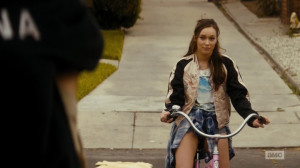
Take a ride with me.
If you were wondering when this occupation metaphor was going to tackle the chaos that ensues after the military pulls out of the destroyed wreckage to leave the local population to its own limited defenses, I think you have your answer now.
But I’m bored talking about how this show likens armed fundamentalists to mindless, shambling villains whose army can grow exponentially because their foot soldiers are easily converted by the contagion within us all. Even the torture scene is kind of dull and not only because they STILL don’t know what to do with Ofelia.
Sure, blah blah blah, they moved the plot forward and yadda yadda yadda it’s a major turning point not only for this series but the entire universe. Major character developments for Daniel and his compass pointing in the other direction than Travis who’s being stalwartly naive. Snore.
I’d much rather talk about how teens break stuff.
Nestled within all the table-setting for the next week’s season finale (which we’ll definitely get to) and more of the troubling analogies that terrorists are zombies and our military is doomed to failure, there is a thread of what we maintain is valuable in life.
Strand is the guy roaming around his cage at the field hospital, testing his cagemates by breaking their spirits. He’s charismatic, handsome, well-dressed in clothes that we attribute to people that are powerful (French cuffs? Ooh la la). We watch him crush poor, simple Doug right in front of us, enough that the guards drag him out of the cell because I’m guessing people don’t want the other prisoners to catch his sad-sackness.
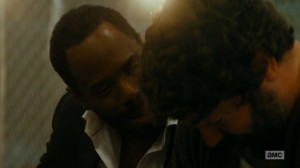
Doug not only can’t catch a break, the breaks keep poking him in the eye then kicking him in the balls.
But through his over-the-top tests of Doug, you get the general concept of Strand’s character. Though it hurts me to have to take his proclamations of being a “closer” seriously because, gah, that’s a terrible line, but it does it’s job in making you feel what this character is all about: he’s playing chess while everyone else is struggling not just to play but to even figure out the rules for checkers.
So when Strand saves Nick from the guards by surrendering his cufflinks, making a show of his hesitation to give away both, think about how he’s probably a step ahead and knows the true value of those cufflinks. The fact that Strand is willing to slowly parcel out his valuables to silly-minded guards in exchange for things he wants demonstrates his cunning. I mean, come on: Nick can’t be worth one valuable thing, let alone two.
I’d like to pause here to say that sometimes it’s really hard for me to say that Nick is valueless but only because we share a name and it’s weird for me to be so mean to myself. I have value, you guys. But Nick is a whiny, entitled, soft-bellied sack of desperation.
A sack of desperation that Stand hopes to shape into something that’ll actually be useful in the new world order, the one where what makes people wealthy shifts and survival is not something that can be achieved by hoarding BVLGARI watches. So you have to assume that Strand has already hit on the fact that the precious status items dripping from his nice suit probably don’t mean jack once COBALT is initiated. So why not let the guards continue to think status symbols mean something and hand them out with faux-reluctance for favors?
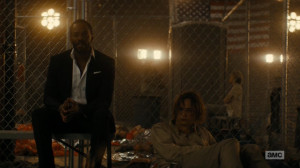
A couple of peas in a frighteningly manipulative pod.
And why go out of his way for Nick? Because Strand knows that, as a heroin addict that’s been able to survive this long, he has value as someone that’s able to weave through the apocalyptic disasters and collapsing civilization to make it here. We’ve seen Nick’s flight instinct (running from the church), his fight instinct (capping his dealer), his sociopathic self-assurance wielded against his own mother (THE SLAPPENING). He knows underground ways to survive on nothing. He knows how to lie, beg, cheat, and steal. Most importantly, heroin has made Nick a conditioned manipulator.
Who doesn’t want that when you have to charm and fleece clans of wanderers between bouts of flesh-eating monsters? You need someone with an instinct to be a piece of crap.
And what you don’t need is to be weighed down by pretty things that mean nothing to your actual survival. Worse, you don’t want to be burdened by the attitude that those pretty things actually mean something.
And this is where the teens come in. First, let me applaud this show for actually showing that Alicia can make a funny. She was sinking so far into the humorless, oft-disgusted teen girl trope that I didn’t know if she’d ever get out of that one-dimensional mire but she’s playful with Chris, flirty even.
I know just last week I was happy that we got to see her deal with her feelings of her zombied boyfriend. But now I’m pleasantly surprised to see her do something else. Whatever. I’m complicated.
Now, I don’t know if there’s a term for what Alicia and Chris are to each other on a family tree since Travis and Maddy aren’t married and Alicia isn’t Travis’s kid anyway. There are definitely no laws against Chris’s lingering gazes. But it still feels weird, right? Because they’re in the same family even though their only relation is that they both think Travis is a total bore.
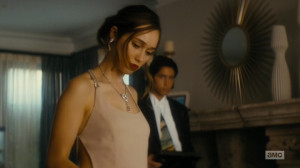
Lucky for Alicia that whoever lived here wore fancy gowns that are a perfect fit for her!
But they are definitely in the same family, loosely associated as it is. A sexy relationship between the teens would be a little off-putting since they are situationally brother and sister. They probably wouldn’t have slow babies or anything but I have a feeling it would be frowned upon. What’s more, Alicia knows that she has a power over Chris. That satisfied smile once Chris tends to his nosebleed from the mere sight of her bare back is very telling (think back to Alicia’s reaction to Ofelia trying to flirtatiously hoodwink a soldier in “Not Fade Away”).
But these are the kinds of things our teens are exploring at the rich-rich house in the neighborhood. What is normal now? What are values? Does anything mean anything anymore?
They rummage through the clothing and toys and gadgets of the people who used to live in this house, talking about how these people used to live a life that they as kids never could. About how they had the childhood they deserved. The teens are still stuck in this mindset that these things left behind mean something. Until they suddenly don’t.
Eventually playing with other people’s toys get tiresome and the teens have to deal with what these things actually signify. The diamonds Alicia is wearing, the expensive tux draped over Chris’s awkward body, the chandeliers, the paintings, the grand symbol of wealth and power that is having an actual cocktail bar baby grand. They don’t mean squat anymore. And having the power to wreck these luxuries because they don’t have power over you anymore? How can you resist?
The jealousy fades and the need to destroy takes over. Chris starts by breaking a picture frame with the family which is a bit on-the-nose but, thankfully, they spared us the image of shattered glass. Alicia follows suit by breaking an empty bottle of champagne, telling us that not only are they probably a little buzzed but they are simultaneously refuting what I assume to be a mythical legend of bottle service (no one actually pays for that, right?).
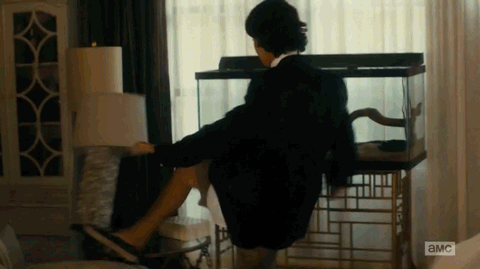
Break stuff!
Still in a tuxedo and a gown, they rip the place to shreds. For the characters, it’s probably cathartic to bust expensive paintings they could never own and crush crystal no one they knew could ever gift them. This is a revenge of sorts for people that lived well. But for us, as viewers, this is more emphasis on how little this all means. The teens are metamorphosing from petty kids to people who understand that the life led by these rich people are meaningless, the comfortable shells of existence are broken, and the pretty status symbols are reduced to nothing when worn awkwardly by children.
Actually, that feeling kind of backfires due to casting. Alicia doesn’t look nearly as awkward in the jewelry, makeup, and diamonds as Chris does in the half-buttoned, two-sizes-too-big tux hanging off his gawky body. But the sentiment is still there. These are kids wearing grown-up clothes and playing in a grown-up house but the chaos of their lives and the coming anarchy will reduce the value of this bastion of luxury into a derelict flophouse with lots of shinies. Zombies will still eat you even if you’re standing underneath a fancy chandelier.
Then to compound the death of materialism via the pettiness of the military, after Alicia and Chris leave the house, back in their normal clothes (they seemingly left all the no-longer-valueables in the house), they notice Hummers zooming around the streets collecting things: bicycles, cases of good ol’ Heisler beer, and other things from houses in the area. They’re not on patrol. They’re treating the neighborhood like Supermarket Sweep. And, if we’ve learned anything during this series, it’s that the military are the representation of people gripping to fastly to the values of the dying world. If they’re openly hoarding, you know the lesson here is that materialism is dead.
Speaking of the military, I guess I can’t not address the torture thing. Obviously this is something that’s been set up from the very beginning, even back when the Salazars were still in the barber shop and Chris was fiddling with Daniel’s straight razor. There are several ways people could’ve happened upon the COBALT information that would’ve made sense: Ofelia could’ve wooed it out of the soldier, Morris could’ve limped out of the building and warned his good buddy Travis about the evacuation, any number of people could’ve accidentally overheard it. They chose, however, to make Daniel go all Sayid on this poor boy.
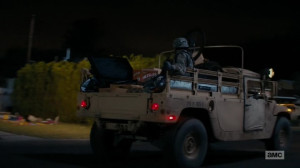
Can’t get enough of that sweet Heisler beer.
This really is a turning point for the show. Travis doesn’t chastise anyone once he sees the information these tactics wrought and, with everyone on the precipice of being abandoned to fend against the monsters by themselves, this feels like a recalibration of the moral compass, if not of the show, at least the last remaining main character living in the dying world.
The sequence honestly was boring to me because it seemed gratuitous. It contributed something to Daniel’s character, I suppose, but he’d already gone through so much of his history with an oppressive, militant government and the macabre tactics his people have suffered that nothing that happens to him or that he does wouldn’t have been unexplained. The only reason I can see for this to happen is in case it’s needed in the future. But for what? Torturing zombies?
Daniel: “Tell me what you know!”
Zombie: *sucking noises*
Daniel: “Who’s you’re leader!”
Zombie: “Braaaaaains”
Daniel: “Yes, who is the brains of the operation?”
Zombie: *more sucking noises*
Daniel: “That’s it! I guess I’ll have to flay some more oh your arm came off and you didn’t even notice. Hmm.”
I’ve seen things floating around at various points of the season that we’re probably looking at the rise of a Governor. We have this protected area that Travis and Daniel will probably fight over to lead and the absolute power will, inevitably, corrupt absolutely.
So if there’s anything we learned from this episode it’s that there are precious few things supporting the artifice of our society. And, just like the company charged with escorting Travis to the field hospital who bolts once their commanding officer gets swallowed by the thrall of ghouls, the removal of key Jenga pieces of that artifice makes the whole thing topple.
So now that nothing means anything and COBALT ensures that anarchy is about to ensue just before the end of this season, we are on the fast track to Rick and the Gang territory. But with things moving so fast, we’re kind of left to wonder how this will be different than the already well-tread premise of wandering from place to place looking for safety and then spending a good long while protecting that place before it gets overrun by people or monsters.
By starting six months earlier we got to have glimpses into the world before the world fell down. But now how are they going to differentiate themselves? Will Strand, Nick, and Liza offer something new? Is there an additional step to COBALT that offers us a twist before the army says byeeeeeee?
I’m curious to see what the final episode will do to make itself different from The Walking Dead. It does have one thing going for it. It can’t be any worse than the CDC exploding. That was rough, man.
Random Bits:
- I didn’t mention Liza very much at all because she’s mostly a pawn for us to explore the medical infrastructure. That is that there barely is one. I’m hoping that she’ll be utilized more in the near future (probably with Strand and Nick) but, otherwise, Griselda’s euthanasia will only be a sore point with Daniel. Maybe. Or he might completely understand. Who knows?
- Are they going to actually do something with Ofelia because she’s coming off mighty vestigial right now.
- All we know is that we need a hero. TOBIAS! COME SAVE US ALL!
- October 2, 2015
- Nick
- Episode Review
- AMC, Fear the Walking Dead

